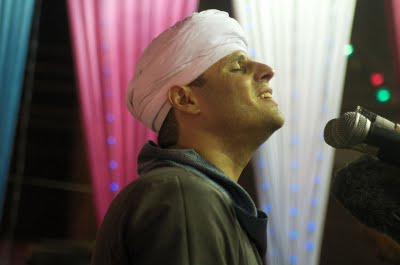Blog January 9, 2014
Egyptian Sufi Celebration: Carnival Mysticism
There is no American equivalent to amulid, a Sufi saint celebration commonly celebrated in Egypt. Imagine a cross between a town fair and a revival meeting with a ripping hot, down-home gospel act belting away all through the night. A brilliant paradox! A mulid is part carnival, with colored lights and banners, party hats, food and souvenir vendors, and an air of family fun. At the same time, the action centers around extremely elevated music featuring a highly skilled religious singer--amunchid, who improvises stirring vocal interpretations of deep Sufi poetry. This is popular Islam, expansive, joyful, communal and celebratory. The munchid and his musical ensemble perform on a high stage at the center of the action, gracing the chaotic activity all around with an air of spiritual transcendence. On the "big night" (layla kabeer), the high point of a celebration that can last a week, a series of munchids hold forth lasting nearly until sunrise. And no one leaves until the last note sounds.
The mulid we attended on July 21 was among the most extraordinary musical experiences Sean and I have ever known, and will make for a singularly memorable segment in Afropop's upcoming Egypt program series. We have first to thank our Alberta-based Egypt scholar Michael Frishopf for connecting with us with his friend in Cairo, Taha Gad, who in turn led us into the inner circle of the Al Tuhami family of El Hawatka in Upper Egypt. (This is the way things work in Egypt. Chains of connection get you to your destination.) Yasin Al Tuhami is perhaps the most respected munchid in Egypt, and we had the privilege to meet and briefly interview this charming elder shortly before making our way to the mulid, where his son, Mahmoud Al Tuhami was featured munchid for the "big night." Everyone treated us with overwhelming warmth and hospitality, feeding us lavishly, explaining what we were about to experience with patience and humor, and facilitating our documentation in a way that would be any field recordist's dream.
 |
| Mulid at Abou Teeg (Eyre 2011) |









